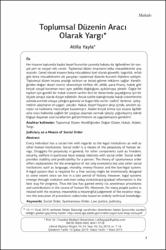| dc.contributor.author | Yayla, Atilla | |
| dc.date.accessioned | 2020-02-27T14:06:37Z | |
| dc.date.available | 2020-02-27T14:06:37Z | |
| dc.date.issued | 2019 | en_US |
| dc.identifier.citation | Yayla, A. (2019). Toplumsal düzenin aracı olarak yargı. Liberal Düşünce, 24(93), 7-16. | en_US |
| dc.identifier.issn | 1300-8781 | |
| dc.identifier.uri | https://hdl.handle.net/20.500.12511/4972 | |
| dc.description.abstract | Her insanın toplumda başka beşerî kurumlar yanında hukuku da ilgilendiren bir sos- yal yeri ve sosyal rolü vardır. Toplumsal düzen insanların beka mücadelesinin ana aracıdır. Genel olarak insanın beka mücadelesi özel olarak güvenlik, özgürlük, refah gibi beka mücadelesinin alt parçaları toplumsal düzenle kuvvetli ilişkilere sahiptir. Toplumsal düzen insana aradığı istikrarı ve önünü görme imkânını sağlar. Kendili- ğinden doğan düzen teorisi ekonomiyle birlikte dil, ahlâk, para-finans, hukuk gibi birçok sosyal kurumun nasıl aynı şekilde doğduğunu açıklamaya yönelir. Özgür bir toplum için gerekli bir hukuk sistemi tarihin ileri bir döneminde yaşadığımız için bir ölçüde amaçlı olarak dizayn edilebilir. Ancak tarihe baktığımızda hukuk sistemlerinin aslında evrimle ortaya çıktığını görürüz ve bugün bile evrim -tedricî ilerleme- iyileş- melere ulaşmanın en uygun yoludur. Hukuk, beşerî hayatın akışı içinde, anonim sü- reçler ve katkılarla mevcudiyet kazanmıştır. Adalet birçok kimse için esasla ilgilidir ama esas hakkında sağlıklı bir yargıya ulaşmak-varmak işleyişi yoğunlaşmış teknik bilgiye dayanan usul kurallarının geliştirilmesini ve uygulanmasını gerektirir. | en_US |
| dc.description.abstract | Every individual has a social role with regards to the legal institutions as well as other human institutions. Social order is a means of the perpetuity of human be- ings. Struggles for perpetuity in general, for other components such as freedom, security, welfare in particular have steady relations with social order. Social order provides stability and predictability for a person. The theory of spontaneous order offers explanations for the emergence of not only economics but also other social institutions such as language, morality, money-finance and the law/legal system. A legal system that is required for a free society might be intentionally designed to some extent since we live in a late period of history. However, legal systems emerge through evolution and even today evolutionary/gradual reformation is the best way for progress. Thus the law has gained entity via anonimous procedures and contributions in the course of human life. Moreover, for many people justice is related with the essence, meanwhile a meaningful judgement of the essence requ- ires the execution of procedural codes/rules based on orderly technical knowledge. | en_US |
| dc.language.iso | tur | en_US |
| dc.rights | info:eu-repo/semantics/openAccess | en_US |
| dc.subject | Toplumsal Düzen | en_US |
| dc.subject | Kendiliğinden Doğan Düzen | en_US |
| dc.subject | Hukuk | en_US |
| dc.subject | Adalet | en_US |
| dc.subject | Yargı | en_US |
| dc.subject | Social Order | en_US |
| dc.subject | Spontaneous Order | en_US |
| dc.subject | Law | en_US |
| dc.subject | Justice | en_US |
| dc.subject | Judiciary | en_US |
| dc.title | Toplumsal düzenin aracı olarak yargı | en_US |
| dc.title.alternative | Judiciary as a means of social order | en_US |
| dc.type | article | en_US |
| dc.relation.ispartof | Liberal Düşünce | en_US |
| dc.department | İstanbul Medipol Üniversitesi, İnsan ve Toplum Bilimleri Fakültesi, Siyaset Bilimi ve Uluslararası İlişkiler Bölümü | en_US |
| dc.authorid | 0000-0002-8047-3128 | en_US |
| dc.identifier.volume | 24 | en_US |
| dc.identifier.issue | 93 | en_US |
| dc.identifier.startpage | 7 | en_US |
| dc.identifier.endpage | 16 | en_US |
| dc.relation.publicationcategory | Makale - Ulusal Hakemli Dergi - Kurum Öğretim Elemanı | en_US |


















